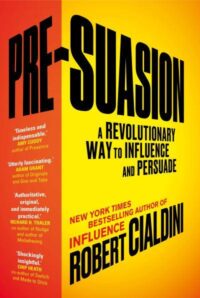Reading Notes for:


The Importance of Attention . . . Is Importance
WHAT’S SALIENT IS IMPORTANT
Anything that draws focused attention to itself can lead observers to overestimate its importance.
When Daniel Kahneman talks, people listen. I am invariably among them.
He was asked to specify the one scientific concept that, if appreciated properly, would most improve everyone’s understanding of the world. Although in response he provided a full five-hundred-word essay describing what he called “the focusing illusion,” his answer is neatly summarized in the essay’s title: “Nothing in life is as important as you think it is while you are thinking about it.”
Because a communicator who gets an audience to focus on a key element of a message pre-loads it with importance. This form of pre-suasion accounts for what many see as the principle role (labeled agenda setting) that the news media play in influencing public opinion. The central tenet of agenda-setting theory is that the media rarely produce change directly, by presenting compelling evidence that sweeps an audience to new positions; they are much more likely to persuade indirectly, by giving selected issues and facts better coverage than other issues and facts. It’s this coverage that leads audience members—by virtue of the greater attention they devote to certain topics—to decide that these are the most important to be taken into consideration when adopting a position. As the political scientist Bernard Cohen wrote, “The press may not be successful most of the time in telling people what to think, but it is stunningly successful in telling them what to think about.”
A similar effect appeared more recently in the United States. As the tenth anniversary of the terrorist attacks of September 11, 2001, approached, 9/11-related media stories peaked in the days immediately surrounding the anniversary date and then dropped off rapidly in the weeks thereafter. Surveys conducted during those times asked citizens to nominate two “especially important” events from the past seventy years. Two weeks prior to the anniversary, before the media blitz began in earnest, about 30 percent of respondents named 9/11. But as the anniversary drew closer, and the media treatment intensified, survey respondents started identifying 9/11 in increasing numbers—to a high of 65 percent. Two weeks later, though, after reportage had died down to earlier levels, once again only about 30 percent
Why do we typically assume that whatever we are focusing on in the moment is especially important? One reason is that whatever we are focusing on typically is especially important in the moment. It’s only reasonable to give heightened attention to those factors that have the most significance and utility for us in a particular situation:
Limited attentional resources on what does indeed possess special import has an imperfection, though: we can be brought to the mistaken belief that something is important merely because we have been led by some irrelevant factor to give it our narrowed attention. All too often, people believe that if they have paid attention to an idea or event or group, it must be important enough to warrant the consideration.
After recognizing the extent of our vulnerability to the focusing illusion, I’ve come at last to appreciate a standard saying of Hollywood press agents: “There’s no such thing as bad publicity.”
